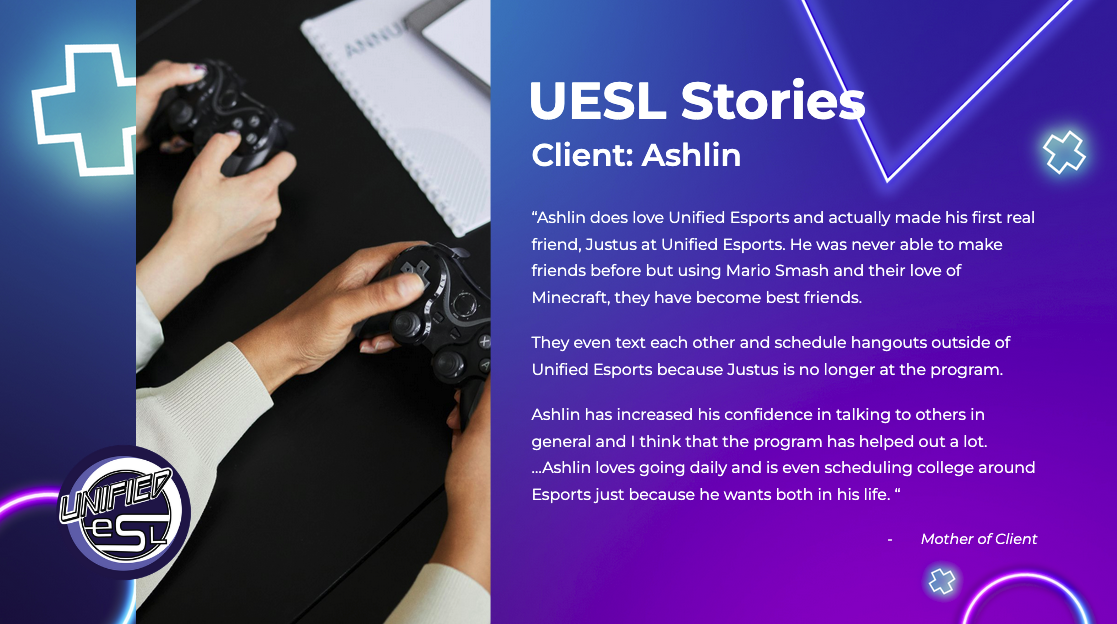How UESL’s Host Schools + Partnered Organizations Are Helping IDD Students Achieve Success Through Gaming + Tech Education
Transformative Partnerships: From Classrooms to UESL Arenas
When UESL partners with a school district and host school, we outfit a dedicated space—whether that’s a classroom, media lab, or multipurpose room—with industry-grade gaming PCs, consoles, VR stations, and adaptive tech. During school hours, this space functions as an everyday classroom; after hours, it seamlessly transforms into a safe, inclusive UESL arena. Likewise, when we collaborate with community organizations (such as TERI Campus of Life), we convert offices, conference rooms, or activity centers into flexible gaming + tech hubs. Our turnkey model means minimal infrastructure changes for our partners and maximum impact for IDD students.
Hands-On Gaming + Tech Instruction: Boosting Cognitive + Academic Engagement
Attention + Focus: UESL’s dedicated coaches design activities that mirror game mechanics—timed challenges, level progression, and instant feedback loops—to help students sustain attention over extended tasks.
Problem-Solving Skills: Puzzle-based games and strategy titles require pattern recognition, sequencing, and adaptive thinking. Our coaches scaffold these experiences, breaking down complex objectives into manageable steps.
Academic Connections: From in-game physics demonstrations to coding mods that illustrate math concepts, students make direct links between gaming scenarios and curriculum standards, increasing classroom engagement and retention. National Institutes of Health (NIH)
Collaborative Gameplay: Building Confidence + Social Skills
Multiplayer modes and team tournaments are cornerstones of UESL’s approach:
Communication: Team strategizing and playful banter during co-op missions teaches respectful turn-taking, clear expression of strategies, and positive feedback.
Confidence: Each victory—whether saving a virtual world or winning a bracket—builds self-efficacy, encouraging students to tackle new challenges both in-game and in life.
Peer Relationships: Working together toward a common goal forges friendships across ability levels, reducing isolation and fostering a genuine sense of belonging. Many of our clients report having made friendships that have continued outside of our programs and have changed their perspective of life.
From Play to Profession: Career Pathways Through Gaming + Tech
Gaming + tech competencies translate into real-world opportunities:
Vocational Training: At Abraxas High School, UESL’s adaptive technology introduced students to graphic design, streaming setups, and digital marketing—skills that led clients to be contributors on major UESL events, apply for internships, and pursue personal goals, like acquiring their driver’s license.
Higher Education: Every year we are seeing more and more universities and colleges adopt esports programs and explore technology education. Our program extends that opportunity to our IDD students, because the Unifed Esports League believes in #GamingForAll !
Certifications: UESL coaches can support gamers in obtaining industry certifications—such as CompTIA IT Fundamentals or Unity Certified User—enhancing employability in tech fields.
Dispelling Myths: Real-World Results of Gaming in Special Education
Myth: “Video games are a distraction.”
Reality: Structured, coach-guided gameplay teaches time management and self-regulation, traits proven to carry over to academic work and daily routines.
Myth: “Gaming fosters aggression.”
Reality: UESL’s emphasis on positive reinforcement and conflict resolution shows that cooperative and creative game genres promote empathy and teamwork, not hostility.
By tracking metrics like task completion rates, social-emotional check-ins, and UESL exclusive individualized technology education plans (ITEPs), UESL helps host schools demonstrate measurable gains in social and emotional skills and peer-interaction scores within the first semester of partnership.
Engaging Families: Reinforcing Growth at Home
We believe learning extends beyond the arena. That’s why UESL:
Provides take-home progress reports that spotlight each gamer’s progress and milestones, as well as suggests at-home activities for additional support.
Hosts tournaments, showcases + open houses where families join in-person or virtually to celebrate student achievements.
Shares online resources—from tutorial videos to discussion guides—so parents can reinforce social and cognitive skills between sessions.
Research-Backed Impact
A JAMA Network Open study of nearly 2,000 children found that those who played video games three or more hours per day outperformed non-players on impulse control and working memory tasks—and exhibited greater activity in brain regions tied to attention and memory. National Institutes of Health (NIH) This underscores how targeted gaming experiences, like those UESL offers, can yield tangible cognitive benefits.
Ready to transform your child’s life with gaming + technology education that supports their passion, not stifles it?
Contact our Client Services team to ask questions, inquire about enrollments, and schedule a tour of the nearest UESL gaming + technology arena!





